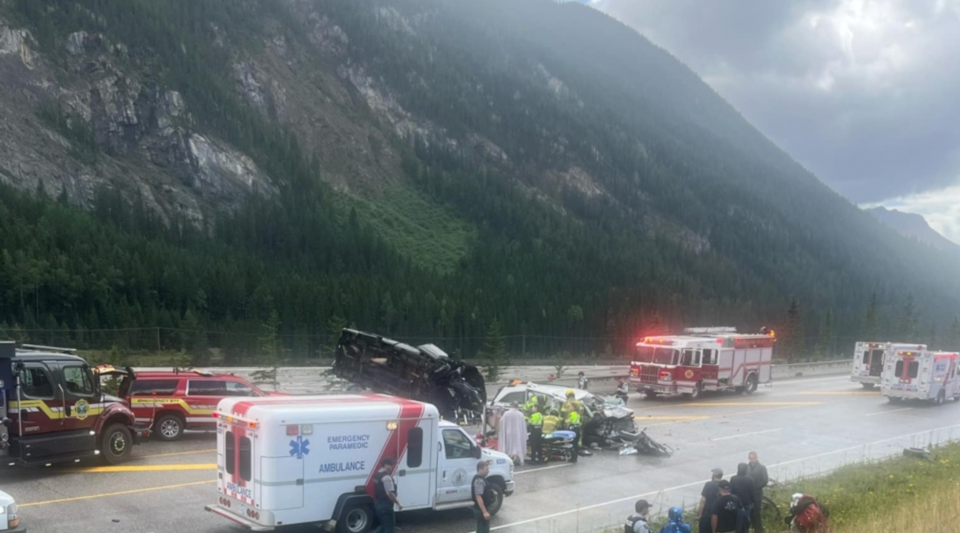FIELD, B.C. – A petition calling for the twinning of a deadly section of the Trans-Canada Highway through Yoho National Park has garnered about 440 of the 500 signatures needed to be delivered to the federal government.
Field resident Alex Goatcher, who is organizing the petition, said this stretch of the Trans-Canada Highway through the park has claimed too many lives in recent years, including nine people in 2022 alone and another this past summer.
“It’s a very dangerous stretch of highway and the volume keeps getting higher and higher every year,” he said.
“The number of times that I personally have had close calls, or the amount of times that friends and coworkers have been trapped and I’ve been trapped in Golden or Lake Louise trying to get home and I can’t, or I’ve had to drive all the way around through Radium just to get back to Field.”
Average daily traffic volumes on the Trans-Canada Highway through Yoho National Park reach almost 7,500 vehicles, according to park data, while traffic peaks in July and August, growing to 10,000-15,000 daily vehicle trips. The forecast is summer volumes will exceed 23,000 per day by 2046.
On Aug. 7, one woman died and another person was in critical condition following a two-vehicle crash near Field. Four other patients were taken by ground ambulance to hospital.
The collision, which shut down the two-lane highway for about eight hours, sent two patients to hospital by air ambulance, including one via STARS air ambulance and another in a fixed-wing plane.
Two of the people were extracted from their mangled vehicle by Lake Louise Fire-Rescue and Golden Fire-Rescue.
The month before on July 18, an adult and a child were taken to hospital following a two-vehicle crash on the same stretch of highway near Emerald Lake Road.
STARS transported the adult female, believed to be in life-threatening condition, to Foothills Medical Centre in Calgary.
The child, in non-life-threatening condition, was transported by Alberta Health Services (AHS) EMS paramedics to the Alberta Children’s Hospital in Calgary.
For Goatcher, he could see the site of the Aug. 7 fatal accident from his front yard in Field.
“To have STARS fly over again … that was kind of the last straw for me. I’ve got memories of 2022 when there were all those accidents,” he said.
“To have this bottleneck between Golden and Calgary, where the rest of the highway between Golden and Calgary is twinned, it’s time that this needs to be done.”
The Trans-Canada Highway in Yoho National Park falls under federal jurisdiction for maintenance, upgrades, and safety.
Twinning of the first six kilometres of the highway in the park from two to four lanes, along with wildlife exclusion fencing and wildlife crossing structures, was completed by Parks Canada in 2018.
Preliminary design and environmental assessment for the remaining 40-km section between Sherbrooke Creek and the western end of Yoho National Park was wrapped up in 2021.
The assessment, combined with public feedback and consultation with Indigenous groups, informed the park superintendent’s decision that the project may proceed when funding becomes available.
The federal government, however, has not earmarked any capital dollars for the project.
Goatcher said he requires at least 500 signatures before he can present the petition to parliament. The petition is open until Nov. 18.
“Right now we’re at 440, so I need 60 more and then it reaches the minimum,” he said.
Terry McGuire, the retired head of Parks Canada’s highway services centre in the parks for about 20 years and the Yoho highway twinning field unit advisor from 2016 to 2020, said the toll on human life will continue to grow until the last 40 km is twinned.
In a recent letter to the Rocky Mountain Outlook, McGuire said apart from the grief and impact on those involved in this summer’s collisions, and their families, delays and inconvenience to traffic and the economy are estimated more than $90,000 per hour.
“In addition, four grizzlies have been killed this year on this stretch of highway, including on June 6 when an incorrigible white female grizzly commonly referred to as Nakoda, who learned early on to access the highway fenced right-of-way to feed on dandelions, and her cubs were killed on it,” he wrote.
“The impact on the national park’s grizzly population with the loss of a breeding female is yet to be felt.”
McGuire said the solution to these totally preventable tragedies is to twin the remainder of this dangerous two-lane highway through the park in combination with the necessary wildlife crossings and fencing designed to deter bears.
“The result will be a win-win-win. Motorist safety improved, wildlife-vehicle collisions minimized, and overall improvement to highway reliability,” he said.
Twinning the Trans-Canada Highway in Banff National Park has seen a six-fold decrease in head-on collisions and fatalities and an overall 80 per cent reduction in wildlife-vehicle collisions, McGuire said.
“The time for simply accepting these totally preventable tragedies as inevitable or talking about the situation is over,” he said.
“Parks Canada completed the necessary design and environmental impact assessments back in 2019. The time has now come to act and implement.”



